Mae McCoy, Sacramento’s boss lady of honky tonk sound and hard country swing, struts through the doors of Amador & Dry Diggings Distillery, ready for some whiskey. She hears the trucking bass stomps of a Waylon Jennings’ tune playing through its tasting room. The song’s chugging like a train pounding down the tracks — and it’s the kind music she truly loves.
McCoy, lead singer of Mae McCoy and her Neon Stars, is just coming off the release of her own debut EP, “One More Time,” on Spotify. A bourbon girl at heart, she’s suddenly ready to celebrate all those hours of working in a Texas recording studio. This spot in El Dorado Hills is her ideal watering hole. Its decor captures the weathered grace of a silvered barn on the open range. The whiskeys here are poured among tempered wood planks, rough and ready camping lamps and gold-flecked wallpaper that evokes a Wild West saloon. The room feels like many of the venues McCoy performs in. She’s been a fan of Dry Diggings’ spirits for a couple years now, having first tried its Engine 49 Straight Bourbon at a local party. But today is McCoy’s maiden voyage to the distillery itself.
The man talking her through a six-flight whiskey tasting is none other than the person who founded it, Cris Steller.
Dry Diggings is a family operation: Cris’ daughter, Erica, is its main tasting host, while his son Kendric is the second distiller, and his daughter Cristine works in the business office. Cris begins filling four glasses with his Engine 49 straight rye, his Bodie 5 Dog whiskey, his Rubicon rye and his Engine 49 barrel strength bourbon. McCoy readies herself with cool anticipation: Cris starts getting into the weeds on each bottle’s mash bill and barreling process as the singer sips.
“It was a great variety of whiskeys to taste,” McCoy notes, “with Cris’ passionate storytelling as a chaser.”
Cris Steller has also been in a leadership role with the California Artisanal Distillers Guild since its creation in 2011. The nonprofit lobbies for key legislation to give the state a better regulatory environment for craft distilleries. Between 2015 and 2022, the organization watched the number of licensed distilleries in California rise from 113 to 159. But as Steller pours McCoy another glass of bourbon, he acknowledges that 2023 was a challenging moment for distilleries from Sonoma County to San Diego.
“When a lot of people really looked into their books at the end of the year, they saw they’d taken a beating,” Steller admits. “But my friends who own wineries had the exact same experience. There’s probably a lot of factors to that. I don’t think it’s one single reason.”
The Steller family is weathering the industry-wide sales slump by continuing to focus on what Dry Diggins is known for: outstanding craft spirits at reasonable price points. They’re also experimenting with new distillations aimed at different palates and sensibilities. Erica, who has the most interactions with customers, says that their whiskey practically sells itself at this point, so she’s been focusing on promoting a new line of gins that her brother Kendric made. She particularly likes highlighting Dry Diggings Botanica, a delicate gin that’s vapor-infused with black and rooibos tea, some florals and a little vanilla bean.
“That vanilla bean tricks your brain into thinking it’s sweet, but there are no sweetening agents added post-distillation, so it’s really unique,” Erica explains. “It almost reminds you of an alcoholic sweet tea. I’m really close with my grandmother, and with her hailing from New England, we grew up being tea drinkers. So with the black and rooibos tea in this gin, it binds with the juniper and creates this almost craft cola or sarsaparilla kind of spice, which mixes with those bright florals and very light pops of citrus over the vanilla bean.”
The Stellers are not the only family distilling around Sacramento. Back in 2016, Kevin and Gail Keck started J.J. Pfister Distilling in Rancho Cordova. Their son, Brian, is its master distiller. One sought after spirit J.J. Pfister is currently making is its Blue & Gold bourbon, which the distillery’s bartenders like to mix into a bourbon peach tea cocktail — a drink that sings with smoky honeydew reflections and deep, noticeable hints of plum.
Forty-six miles northeast of J.J. Pfister, the team at Georgetown Distillery is building its reputation on rye whiskey and blueberry and pineapple-infused gins, any of which can be sampled on site and paired with mouth-watering, farm-to-fork appetizers like succulent pork belly. And 38 miles west of the state Capitol stands Patio29 Spirits Co. It’s been grabbing attention by creating bourbon from corn, rye, wheat and barley that’s grown in Yolo County.
Whether in Sacramento or the upper climbs of the Gold Country, craft distillers are ready to give the drinking public a taste of all of the possibilities within libation.
That Midtown magic
Johnathan Piner slowly dumps pounds and pounds of pickles into a vat of perfectly clear vodka. He’s finishing a cauldron of a soggy pickle concoction — a warlock’s brew of sour and tangy fragrances that will ultimately yield one of Midtown Spirits’ popular go-to drinks.
A few feet away, standing behind a gleaming 400-gallon customized hybrid still, are the company’s owners, Jason Poole and Dave Abrahamsen. The two are prepping their very first shipment of Pickle Vodka for the new Natomas-area Costco. It’s a big moment for their little business on 19th Street.
Poole and Abrahamsen were veteran bartenders in the central city when Poole started dividing his time between mixing drinks and producing his own brand of Bloody Mary mix. That was in 2014. Abrahamsen eventually joined Poole. The success of their business, Preservation & Co., eventually led the partners to have a broader vision of opening Midtown Spirits.
“We decided to complete the cocktail and open up a distillery,” Poole recalls, adding that they dreamed up a bar specially calibrated for highlighting the gins, vodkas and cold brew coffee liquor they would be making.
“The biggest thing was we wanted quality cocktails — but quickly,” Poole stresses. “That’s why we have a slushie program that’s all pre-batched, as well as our hot drinks and cocktails on draft. We wanted our staff to have more time to discuss the spirits we’re making with customers, rather than just spending all their time mixing their drinks.”
But the distillery founders never could have guessed they’d be launching Midtown Spirits at the height of a pandemic.
“When we started, all we could do was to-go drinks,” Poole observes. “But the dog park that’s right across the street had recently been finished, and it was great because people who were going out to take their dogs there would just stop here to get a to-go cocktail. That was kind of what we had for getting exposure early on.”
Today, Poole and Abrahamsen have not forgotten all the dog lovers who initially helped spread the gospel about Midtown Spirits. In honor of them, the distillery does various charitable drives to support Front Street Animal Shelter and the local chapter of the SPCA.
But while canines and cocktails may have helped spark Midtown’s opening buzz, it’s been the same dedication to quality that made Preservation & Co. a sensation that’s now getting big retailers like Costco interested in its bottles. In addition to quality grain sourcing and careful distillation, Midtown has also carefully created gins for all four seasons. They just recently released their spring gin.
“It’s more herbaceous and floral and citrusy, and it’s on the lighter side with the juniper,” Piner says. “It’s really approachable in that sense.”
Piner, who was a bartender before he was a distiller, designed a cocktail called the Spring Forward to highlight this rare seasonal gin, which includes dry vermouth, celery bitters and some Genepy, a French herbal liqueur.
“They’ve given me a lot of freedom to try what I want,” Piner says of Poole and Abrahamsen. “We’re about to have our first-ever rums coming out, and there’s just so much more we are looking forward to doing.”
High Sierra
A tank-like SUV turns by grimy snow drifts that are piled up under the frosty sugar pines. It soon parks near a storefront where, beyond the doors, people are cozying together near walls decked in elk antlers, wooden snowshoes and leather-bound shot glasses. What they’re sipping on during this chilly afternoon is one of California’s only high-elevation whiskeys.
Nate Randall and Bonnie Boglioli-Randall were living in the Silicon Valley when they fell in love with Calaveras County’s mountain town of Arnold. The remote hamlet is sometimes called “the heart of the Sierra.” The Randalls certainly saw its forested slopes that way whenever they’d stay overnight at a friend’s cabin. Nate was a hobby distiller at the time; but in 2020, he and Bonnie decided to open a commercial distillery in this place that was so enchanting for them. It marked the first legal spirit-making operation that not only Arnold, but all of Calaveras County, had seen in generations.
The couple called their daring dream Hinterhaus Distilling. Nate and Bonnie both have family roots in the Bavarian Alps, where Hinterhaus is a term for “the little house in the back.” The distillery would be their own little whiskey house for tourists and the community.
Nate Randall and Bonnie Boglioli-Randall moved from the Silicon
Valley to the Calaveras County town of Arnold and started
Hinterhaus Distilling. They use fresh Sierra Nevada mountain
water and local botanicals in their spirits. (Photo by Guy Dossi)

“When we were trying to think of a name, we kept coming back to the fact that the Sierra Nevada is sometimes alluded to as California’s Alps,” Bonnie recalls. “We just loved that idea.”
Nate and Bonnie were determined to have spirits tied to Northern California, including using fresh Sierra Nevada mountain water. That started by making a vodka from grapes grown in the nearby vintners’ oasis of Murphys. In no time they were complementing that product with a gin that drew its botanicals from the surrounding woods and mountain meadows. Nate and Bonnie truly started to see their vision come into focus once they began working with Golden State farmers on sourcing their barley, which was then malted at Admiral Maltings in Alameda. This would be the key to their rare bourbons and whiskeys.
The town of Arnold sits at 4,000-feet elevation. Nate decided to make his bourbons and single malt whiskeys with an open-air fermentation process and no real temperature controls. He has the same philosophy for his barrel-aging process. Essentially, Hinterhaus allows its Sierra microclimate to have a direct impact on the characters of its whiskeys. The ambient tension between Arnold’s hot dry summers and cold wet winters causes the wood in the whiskey barrels to contract many more times a year than it would in otherwise traditional settings. This leads to an accelerated aging process and highly particular contours to the barley juice inside.
“We’re just trying to have a sense of place in everything we do,” Nate acknowledges.
Those results can be tasted in one sip of Hinterhaus’ Calaveras cask-finished bourbon. This spirit has a calm caramel presence at its center, electrified by hot hints of molasses and a little smoldering clove. It’s an ideal whiskey for cold winter days.
Nate has also been working with wineries in Murphys to get wine barrels for finishing some of his other spirits. For him and Bonnie, it’s all about anchoring their craft to the Calaveras experience.
“Being committed to that Calaveras tie is what makes what we’re bottling very unique,” Bonnie muses. “There’s only a few other places that make whiskey in the world that are at a similar climate.”
Recommended For You
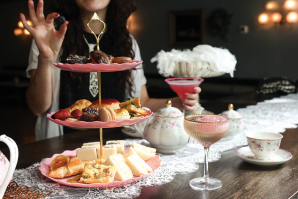
Is Tea the New Happy Hour?
These Capital Region tea rooms bring a California twist to an English tradition
Afternoon tea evokes something people have always sought — “a feeling of rarely experienced elegance and class,” Mueller says.
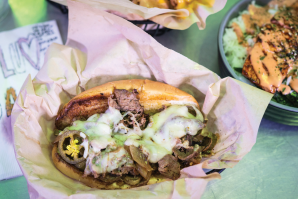
Jet’s Sets Off
This Midtown hotspot started out as a college student’s pandemic project
When Jet Bonanno started his shoestring home-based food operation, he never dreamed it would morph into a thriving brick-and-mortar restaurant. But that’s exactly what happened when Bonanno opened Jet’s American Grill & Bar at the ripe old age of 22.
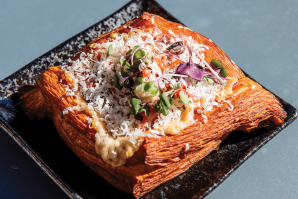
Pop-Up Popularity
Female chefs and bakers find success outside the traditional restaurant model
These nomadic eateries, which surged in popularity around the Great Recession, came in vogue again during the COVID-19 pandemic, often as the only option for cooks in lockdown.
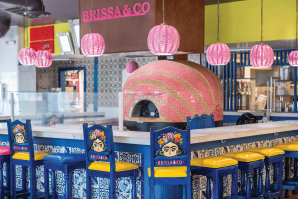
La Dulce Vida
Meet the Capital Region panaderos bringing creative flavors and techniques to Mexican bakery classics
Pan dulce (in English, sweet bread) is being reimagined by intrepid bakers across the Capital Region. Comstock’s recently spoke with three local panaderos who are taking pan dulce to new heights while simultaneously paying tribute to the cultural traditions and food memories that shaped them.
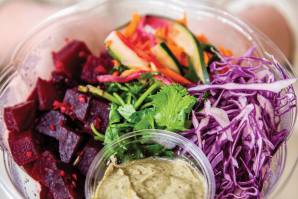
Reset and Drink Up
These Capital Region cafes offer food and drink with a side of health care
Across the region, health food businesses are branching beyond acai bowls and chia-seed puddings to offer customers a broader spectrum of health programs and treatments. From juice cleanses to lattes with a side of ionic detoxification, the spread of these businesses demonstrates that customers are willing to invest in their health — and are looking beyond the traditional health care system to do so.
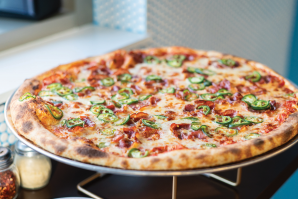
Reeling Them In
Local restaurants use Instagram Reels and TikTok to attract customers
Your experience of social media may be as a fun time-waster, an angst-producing FOMO (fear of missing out) machine or the reason you know your Uncle Dennis believes in ancient aliens. But to many restaurant owners, social media is a necessity.




